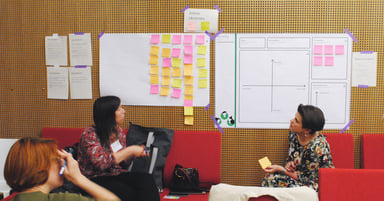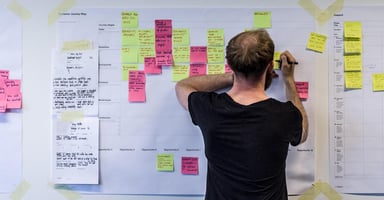10 Questions to Ask a Project Manager Before a New Project

Check out this list of 10 must-ask questions to your PM and get it started well!
With any new project that you and your team undertake, one thing is absolutely vital – communication. Indeed, a lack of adequate communication can prove to be the downfall of many what would otherwise be successful projects.
As such, your project manager (PM) should always be open to any questions that you have at any point of the process. Your PM should have a plan of the whole project ready to go before anybody starts work on it. Of course, this plan will be flexible, for, once underway, changes and alterations will inevitably occur – and it will be the PM’s job to make sure that everyone involved – including you – is kept up to speed with what’s happening.
Netguru builds digital products that let people do things differently. Share your challenge with our team and we'll work with you to deliver a revolutionary digital product. Create a product with Netguru.
Yes, communication is key to all successful projects. And so, you need to make sure that you start as you mean to go on by addressing some vital points with your PM at that very first meeting before work on the project actually begins.
There are of course many questions that might spring to mind when you’re at that first meeting, and when they do, you should take it upon yourself to open up a communication pathway and ask them. However, we feel that there are 10 absolutely crucial questions you should always put to your PM before starting a new project, and we have listed them below with explanations as to why they are so important.
Of course, every project will, by nature, be very different, and you may have further questions that you will find yourself wanting to ask.
Ask them, too. The important thing is to make sure you are on the same page as your project manager right from the start, and that you know exactly what to do, where to look and who to turn to during each new phase of the project should any difficulties arise.

This is what happens when your PM and you know answers to right questions. Let's go!
1. How Should I Communicate My Ideas?
As I hope has already been made clear, communication is absolutely imperative to the success of a project. And so it is this that should always be the very first question that you ask.
It is quite possible that any real-time communications – such as Skype chats, phone calls or instant messaging – might be limited to a single liaison, say, once a week. You may of course have questions, concerns or brainwaves in between these sessions, and so you should ask your PM the protocol for communicating any thoughts or ideas that you have. It may be, for instance, that outside of the allotted meeting times that you will be asked to conduct in asynchronous communications, such as by sending an email. If this is the case, then you should also ask that any emails that you send will be acknowledged and replied to on the same day that you send them, so that you are not left fretting until the end of the week that your concerns or ideas are being ignored. As will reiterated again and again in this blog post, regular, free-flowing communication is key to great working relationships that result in success.
2. Which Communication Tools Are We Using?
If your PM does not make this absolutely crystal clear in his or her answer to question 1, then you will need to follow up with this one.
So, will the main communications take place via:
- Email?
- Skype?
- Google Hangouts?
- Slack?
- Pivotal Tracker?
- Other?
There are many ways you will be able to keep in contact with your PM and the team – absolute transparency is vital to the success of your project. So, make sure you’re clear on what channel is being used, and then, if you’re not familiar with it already, find out exactly how to use it.
3. What Is The Communication Flow Structure?
Many factors come into play when devising a flow structure for communications throughout a development team. And perhaps the most pressing is to whom you will reach out to as a first port of call. Is it always the project manager, for instance, or does the person vary as the project presses forward and different iterations are headed up by different team members? Indeed, how much contact is it pertinent to make? Obviously you don’t want to become a nuisance and interfere with the flow of the project, but you don’t want to be left in the dark either. So ask – will you be invited to review progress weekly, for instance, and offer feedback, or will it be on a more ‘as and when’ basis?
Consider, also, the different time zones in which the various members of the team will be living. Ask your PM how communications are going to be managed to deal with this (you can take a look at this ultimate cheat sheet on communication across time zones for a start).
4. What Type Of Process Model Will Be Used?
This is a very important consideration. There are various types of process model that all vary quite significantly.
At netguru, we work with iterations and daily standups, basing on the principles of the Agile Manifesto. The iterative model, where development is broken down into tiny chunks, with each chunk is thoroughly reviewed and tested to identify where improvements can be made, and then the process is repeated again until a desirable result has manifest.
What are other models? For instance, there is the basic waterfall model, where each stage of development is completed in full before moving onto the next.
Also, there’s the V-model which is similar to the waterfall model, only with testing phases running along in parallel to each phase of production.
There are many more model types as well – so it’s important that you ask right from start precisely which will be used, as then you will have a better idea of when to make yourself available for various reviews along the way. You will do well to familiarise yourself with the process, too.
5. How Will The Workflow Be Managed? How Will We Be Alerted If We Are Off Schedule Or Unforeseen Problems Arise?
This is another important question that again goes back to the root concern – how will communication be managed?
Thankfully there are many online tools available now to help teams manage workflow. From simple process flow tools like Basecamp and Trello, time tracking tools like Toggl, to more complex constructions such as Pivotal Tracker, employing one of these process management mechanisms into your project will make life much easier for all involved, and everyone will be able to see what everyone else is doing, the progress that is being made, and if deadlines are being met.
If one of these tools is being used then you should ask for login details so that you can watch what’s going on.
6. Who Is Responsible For The Project?
It is important that you get to know every member of the team that you are working with. The more team members you can build up a friendly, working relationship with, the greater the likelihood of overall success.
Ask to be introduced to everybody – or as many people as is feasible – and find out exactly what their roles are in the project. A good PM will facilitate this and organise the necessary introductions to open up communication pathways.
You will want to be in communication with:
- The development team.
- The person who is responsible for quality assurance (i.e. the professional tester(s) of the product). And ask, as well, to discuss the criteria under which the product is being tested.
7. Can All Of My Requirements Be Met?
This is something that you absolutely must establish at the outset. If you’re building an app, for instance, which you want to do X,Y and Z, then it is important that you are aware if the team can only accomplish X and Y or Y and Z.
So, ask, in no uncertain terms, whether or not it is feasible that the team can deliver exactly what you want. This will avoid future disappointments, and will open up a communication pathway for alternatives to be discussed.

Paint your product's future with bright colours, but don't forget to consult these hues with your PM. A few pastel shades might be useful, too.
8. How Are Project Priorities Translated Into Iterations, Estimations and Processes?
Project priorities will naturally evolve and change as the project progresses. To make sure that you’re happy with what’s happening, you will need to be in constant communication with both developers and the PM.
As you identify new priorities – and you will do this through your agreed communication pathways (see questions 1, 2 and 3) – you will want to be informed as to how these new priorities will slot into the schedule, how long they will take to be completed, and when you will be invited to review what’s been built and offer feedback. Here's a few techniques we use while planning a weekly iteration with Pivotal Tracker and a great read on doing the estimations the right way.
9. How Will The Final Product Be Distributed?
This question is particularly pertinent if you are having an app developed. Absolutely, you must make sure that you are in agreement as to which platform (i.e. iOS, Android etc.) that you are having your app built for, and everyone must also be clear as to how exactly you plan to monetize the app – via a download fee, or through advertisements, or both?
You will also want to ask about how beta testing is conducted, and what you expect from your developers in terms of maintenance and updates for the app.
10. How Can I Help And Support You Throughout The Development Process?
With great communication will hopefully come a great working relationship. Indeed, this is the ideal scenario, where both you and your PM will feel like you have the freedom to say and ask anything of each other concerning the project.
So, ask how you can help and try and take the advice. If the PM says that they only like to be contacted with a client once a week when there’s lots to discuss, then you will show your willingness to help and support the process by respecting that wish.
What questions do you feel are the most pertinent to ask a project manager? Let us know in the comments below.
Are you planning your mobile app and are not sure if you got everything right? Here's a list of points to consider. Jump in!















.jpg?width=384&height=202&name=Netguru-Biuro-2018-6425%20(1).jpg)







